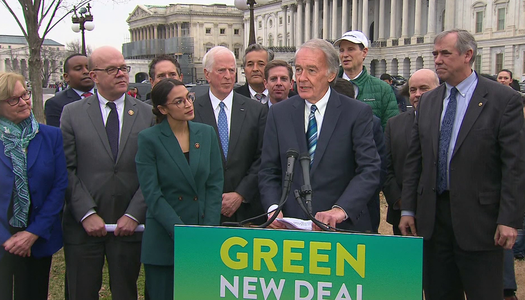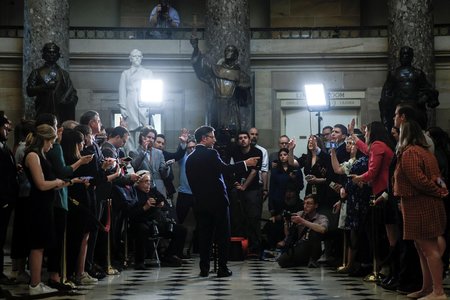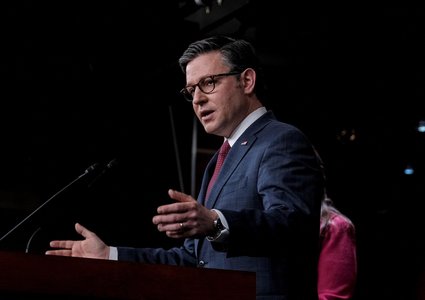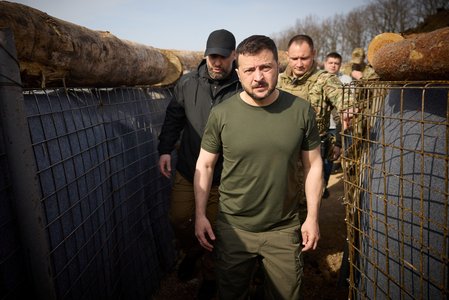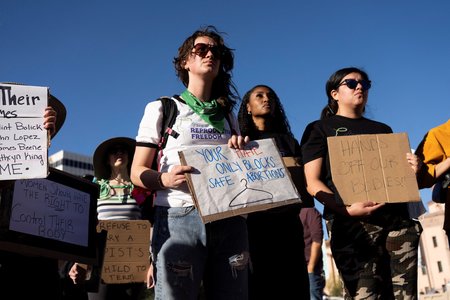ROBERT COSTA: Off the rails. The president declares a national emergency. I’m Robert Costa. Welcome to
Washington Week
.
President Trump reluctantly accepts a bipartisan spending deal, then declares a national emergency to build at the border.
PRESIDENT DONALD TRUMP: (From video.) We’re talking about an invasion of our county with drugs, with human traffickers, with all types of criminals and gangs.
MR. COSTA: Democrats and some Republicans accuse the president of sidestepping Congress.
HOUSE SPEAKER NANCY PELOSI (D-CA): (From video.) It’s not an emergency, what’s happening at the border. It’s a humanitarian challenge to us.
SENATOR SUSAN COLLINS (R-ME): (From video.) I’m disappointed that the president has chosen to go this route.
MR. COSTA: And a new attorney general is sworn in. And a former acting FBI director speaks out, next.
ANNOUNCER: This is
Washington Week
. Once again, from Washington, moderator Robert Costa.
MR. COSTA: Good evening. President Trump averted another shutdown on Friday by unhappily accepting a bipartisan deal to keep the government open, but he also sparked a political and legal firestorm by declaring a national emergency at the border despite top Republicans and Democrats urging him to hold off. The executive action will allow him to divert money from the Pentagon, Treasury, and other departments.
PRESIDENT DONALD TRUMP: (From video.) We have certain funds that are being used at the discretion of generals, at the discretion of the military. Some of them haven’t been allocated yet, and some of the generals think that this is more important.
MR. COSTA: The move comes after the president failed to get the 5.7 billion (dollars) he wanted. The deal, instead, is 1.375 billion (dollars).
Joining me tonight, Julie Hirschfeld Davis, congressional correspondent for
The New York Times
; Garrett Haake, Washington correspondent for MSNBC; Abby Phillip, White House correspondent for CNN; and John Bresnahan, Capitol bureau chief for
POLITICO
.
When you think about that Rose Garden performance by the president today, Julie, we heard the president making the case for a national emergency at the border, a crisis, but is there a crisis at the border?
JULIE HIRSCHFELD DAVIS: There’s no real crisis at the border. There are a lot of challenges at the border. Border crossings – illegal border crossings are actually down, historically speaking. The number of families showing up, though, rather than single usually men in the past, has gone up a lot, and that’s why there is a humanitarian challenge. You have a lot of people showing up asking for asylum, saying they’re fleeing violence and persecution. There’s obviously a drug problem. You know, there was just a huge drug bust. There’s a lot of drug trafficking problems at the border and of course there are human trafficking problems as well, all of the things the president talks about. But there is not now a crisis that didn’t exist last year or two years ago or even five years before that. There are a lot of challenges at the border, but there’s no invasion in the way that the president likes to talk about it. And so he even alluded to this in the Rose Garden today, saying he didn’t have to do this right now. He’s just doing this so that he can build a wall faster, he says. The fact is that there is no urgent issue that he is trying to address.
MR. COSTA: Let’s hear what the president said about that, his case today about what Julie just said.
PRESIDENT DONALD TRUMP: (From video.) I could do the wall over a longer period of time. I didn’t need to do this, but I’d rather do it much faster. And I don’t have to do it for the election; I’ve already done a lot of wall for the election, 2020.
MR. COSTA: Abby, does this hurt the president’s case if it goes to court, as he expects it to go?
ABBY PHILLIP: Well, it’s certainly a politically damaging admission that he didn’t really have to do this, he decided to do it because he, at least in this part of the press conference, said that it would allow him to build the wall faster, but then he later acknowledged that perhaps court challenges would hold it up. But I think legally there are a couple of questions. It could be that the courts might try to weigh this issue of a national emergency: Does it justify what the president is trying to do? Or they could simply look at the issue of the separation of powers. The president is taking the power of the purse away from Congress in this particular instance, and he just admitted today that he’s doing it just for expediency, perhaps for political expediency. I think that’s very problematic for the president, and it’s just another example – just like with the travel ban years ago – of the president making public statements that later on come up front and center in court cases that undermine his administration’s strategy.
MR. COSTA: And if you look at history, the Supreme Court before has looked at presidential executive orders – Harry Truman in 1952, Bill Clinton in 1995 – and ruled them invalid, but most national emergencies have stood. But beyond the courts, John, you have a president who’s going to be challenged by House Democrats. What are we hearing from Speaker Pelosi, her lieutenants the committee chairmen, about how they’re going to go after this national emergency?
JOHN BRESNAHAN: They’re going to move a joint resolution which to turn off the emergency, to invalidate it, and that will happen pretty quickly after they return from recess. They’re going to recess for a week, they’ll come back, they’ll move pretty quickly on it. It’s a straight-majority vote. They’ll get plenty of Democrats to pass it. There may even be some Republicans who vote for it. Justin Amash, who’s a noted libertarian/Republican, he just said he didn’t like what Trump did. The question really becomes the Senate. This is a resolution that’s privileged, is the term; it has to be taken up in the Senate within 18 calendar days of after it passes the House, and then that becomes a challenge for Senate Majority Leader Mitch McConnell and the White House: Will Republicans bolt from Trump and vote with the Democrats to say you’ve gone too far on this one? And that’s – it’s going to be really close. It’s going to be – it’s going to be an interesting issue. Now, if it passes the Senate, they get a majority, the president can veto it; there’s no way they’re going to override the president. But his own – enough members of his own party will have broken with him and it’ll be – it’ll be a big political issue for him.
MR. COSTA: So pushback in the courts, we have pushback from Democrats. You have to wonder, is there going to be pushback among people within the administration, at the Pentagon? Let’s talk about the specifics for a moment. The spending deal, as we said, includes 1.375 billion (dollars). That’s for 55 miles of new barriers along the 1,900-mile U.S.-Mexico border. Democrats made sure those barriers will not be massive concrete walls, as Mr. Trump once promised. It also includes provisions for border security such as new technology, the hiring of new immigration judges, and money for humanitarian aid. According to
The Washington Post
, the Trump administration through its emergency declaration is also eyeing billions elsewhere in the federal budget for border barriers such as 600 million (dollars) in a Treasury Department account dealing with seized drugs, and 2.5 billion (dollars) from a related Pentagon program, and more than 3 billion (dollars) from other military construction projects.
Garrett, you track this all closely on Capitol Hill. Will there be any kind of counter inside of the administration about the use of these funds, whether it’s from committee chairmen who want to appropriate and make the decisions on their own or from Cabinet secretaries?
GARRETT HAAKE: This was a day when I think Washington really missed having John McCain around. I cannot imagine how mad he would have been, the guy who was a champion of regular order and of military appropriations, both of these issues – I can just imagine him screaming in the hallways about this. But yeah, the White House now has two problems.
First of all, they’re going to have to fight this in public. The president said in that news conference that he had talked to generals whose money he was going to be taking away and they said don’t worry about it, we’d much rather have this money go to the wall; really? There will be plenty of Democratic committee chairmen who’d like to find those generals and bring them down to Capitol Hill and make them talk about it, so there will be a public part of this.
And then privately this also makes the president’s job much more difficult when he goes for a new Pentagon budget next year. Appropriators take their jobs very seriously; the last thing they want to hear is that their money which they dole out very specifically was just given away to someone else. How do you make the argument that you need X amount of dollars for Treasury or for a drug program or for the Pentagon if the president’s just going to move it around?
So there will be pushback publicly on the front end and then quietly, I think, in the next round of appropriations to make sure that the president understands that even these kind of actions will have longer-term consequences than he thought about.
MR. COSTA: I saw, real quickly, Garrett, that California and the governor there, Gavin Newsom, already planning a lawsuit. Where is this 55 miles of barrier? Where is it actually going to be built?
MR. HAAKE: The barrier that was approved in the spending bill is actually supposed to go in Texas, in the Rio Grande Valley. This is one of the areas where the Border Patrol has said that they actually need – they actually need additional fencing. Democrats really pushed Republicans in the process of the – of the conference committee here to have an evidence-based approach to this. And this is where they agreed it was. But even in that bill, it’s interesting, they – Democrats made very clear, it has to be the existing types of fencing that already exist. It can’t be a concrete wall. And they specifically listed off pieces of the border in Texas where wall cannot go. So if the president uses this emergency declaration to try to build in any of those places, he introduces a whole other host of problems. The other thing about it being in Texas, you’ve got a Republican governor and a Republican attorney general. So you’re less likely to have the state file suit than you would if you tried to build this in California.
MR. COSTA: You know that T.S. Eliot poem, “The Hollow Men,” “This is the way the world ends, not with a bang but a whimper”? You got to think about Leader McConnell making the news this week about how this will all end. And it was this low-key statement on the Senate floor. I think we have it, if we can show it to you for a second.
SENATE MAJORITY LEADER MITCH MCCONNELL (R-KY): (From video.) I would say to all my colleagues, as indicated, he’s prepared to sign the bill. He will also be issuing a national emergency declaration at the same time. And I’ve indicated to him that I’m going to prepare – I’m going to support the national emergency declaration.
MR. COSTA: That dry statement from Leader McConnell. So much power in Washington, but little enthusiasm for the way this all played out. What was his role here in coming around and supporting the national emergency, something he detests ideologically?
MS. PHILLIP: Right, absolutely zero enthusiasm. (Laughter.) And it masked hours of drama, really, when it came to President Trump, getting him on board with this bill. I mean, the president – even though he is not one for details, decided to dig into this bill around midday on Thursday. And that was just hours before McConnell had expected to have a vote on this. He had to get on the phone with President Trump multiple times,
The Washington Post
reported. And
CNN
also reported that the president had told his aides: I don’t want to sign this thing. McConnell basically had to drop his opposition to a national emergency, which is a really big deal for him, because he’s opening himself up to forcing his members basically to take a painful vote, as John just mentioned.
This resolution of disapproval is not going to be a great thing for a lot of Republican senators who are going to be forced to basically cast a vote saying: I disagree with the president’s decision to build this wall on executive authority. And McConnell had to do that in order to get his signature on this bill. It just goes to show no one wanted a shutdown, and no one wanted a shutdown more than Mitch McConnell.
MR. BRESNAHAN: The other part about this is – and Abby was just talking about it – is, you know, White House Chief of Staff Mick Mulvaney. There was – you know, he was talking to McConnell. He was talking to House Minority Leader Kevin McCarthy. He was calling people on Thursday saying: We need a CR. We need to – we need to slow this down. We need a couple weeks.
MR. COSTA: You mean a bill that wouldn’t appropriate across the government, just to keep the government open at current levels.
MR. BRESNAHAN: Right, to avoid a shutdown. And McConnell and McCarthy were like, no. (Laughter.) We’re doing this now. We got to go now, OK? And then – I mean, the reality here is Trump boxed himself in. He boxed himself in – you know, he – and I’ve kept saying this – he lost this wall fight, you know, in Congress, on Capitol Hill, he lost it on election day, OK? And it’s been just a slow-motion death, OK? I mean, he’s lost this for months. You know, as everybody’s mentioned, he couldn’t get it through Congress. Now he did a national emergency.
He actually, though – in a way he got Congress out of this jam. We have been stuck on this for, you know, two and a half months now. And, like, you know, there was actually some sighs of relief. Yeah, we hate this but, you know, at least we can start talking about something else for a little while.
MR. HAAKE: Hearing that from McConnell there again, he delivered it so dryly, but he also called the vote, I think, 25 minutes later. It was like he got off the phone with the president and said: We’re voting right now before anybody has a chance to change their mind.
MS. DAVIS: Right. And he had to interrupt another Republican senator to do that. And the reason he did is because he did not want to give one extra second for Trump to change his mind, which he has repeatedly done in this – in this back and forth, really since 2017, since he first came in. I mean, from that first time that he, you know, threatened to veto that omnibus bill that didn’t have money for the border wall. And he – and, you know, Republican leaders, again, had to rush down to the White House and try to talk him out of it. And the fact that he had been so backed into a corner, I think, really put the Hill on edge that if – you know, if they had a yes from him now, they had to strike while the iron was hot.
MR. COSTA: And John mentioned how the White House was almost outside of the process here. You had Appropriations Chairman Richard Shelby in the Senate, Nita Lowey from New York, House Democrat, they cut this deal.
MS. DAVIS: They absolutely cut this deal. And the interesting thing there is that in the beginning, when Trump was first sworn in, when he first came in, that is how they were doing these appropriations bills. He was essentially, you know, keeping it at arm’s length. He wasn’t into the details. He didn’t really get how it worked. And they were cutting their deals and bringing them to the president. And repeatedly they did not have money for the border wall, and he swallowed it. And finally, he tried to exert himself. He tried to figure out a way to reclaim this – the power in this struggle over money and the wall. And he couldn’t figure out a way to do it. And so in the end, he had to give them the power back so they could cut the deal.
MR. COSTA: You were down in El Paso, Texas. The president had a political rally there, 2020 reelection campaign. This issue isn’t going away, because if you looked up at the rafters at that rally there was a big banner, “Finish the wall.” Is that the new message out of this White House? Is that the message on immigration? And is that the core of the reelect?
MR. HAAKE: Absolutely. I mean, it’s possible that it matters less to this president whether he does this than whether he can continue to run on it. It was such a good issue for him in 2016. Even if not another foot of wall is built, the 2020 reelection message can be: Look at how hard I fought for this and look at these activist courts and these obstructionist Democrats who are getting in the way. Vote for me. And, oh by the way, keep voting for Republicans so we can get this done. He very much wants to continue to make this an issue. Of any city in the country, El Paso, Texas is actually a pretty Democratic city. He’s trying so hard to make this point. At this point, it doesn’t appear that he’s convincing that many people, but in another presidential election I think we’ll hear this over, and over, and over again.
MS. PHILLIP: He also very much needs to run on the wall. If you remember back at the midterms, the president pivoted heavily to immigration, to the caravan, because the economic message wasn’t breaking through. It wasn’t getting Republican voters out to the polls. He had to pivot strongly, in his view, to these sort of bedrock issues that he ran on, in order to try to help the few Republican candidates he could, in places like Florida and elsewhere. And I think he’s doing that again with his reelect. You hear the administration talking a lot about wanting to run on the economy, but they’re really not running on the economy. They’re running on the wall and they’re running on immigration.
MR. HAAKE: When was the last time you heard anybody talk about the tax cut?
MR. COSTA: But what about the cost? So the president’s rousing his core voters, the right-wing likes that he’s fighting for the wall. But what about Republicans on Capitol Hill? When you’re up there, John, do they seem exhausted by all this – the shutdowns, the standoffs, the constant on immigration?
MR. BRESNAHAN: The shutdown was a disaster for Republicans. There’s no way around it. It was a disaster for Trump. It was a disaster for the whole party. I think they really kind of – yeah, they – like I said, they hated the emergency, but they were, like, thank God this is over, at least for now. Let’s let the courts decide this. I think they want to move on. They want to attack –
MR. COSTA: To what – prescription drugs, infrastructure?
MR. BRESNAHAN: Well, they – well, in the Senate they’re going to move on to abortion right now, because they want to talk about the Virginia abortion bill, and that was a disaster. And they want to – you know, and they want to go slam the Green New Deal and Alexandria Ocasio-Cortez, and all these new Democrats. They want to go paint them as radicals – socialists who are going to, you know, destroy capitalism. And so they want to – you know, they want to talk about something else. They need to move off this. So, I mean, for now, this gets them out of the box.
MR. HAAKE: That’s part of the reason you had Lindsey Graham over the last couple weeks going – every time he’d get in front of a television camera saying: Mr. President, if you think this is an emergency, go ahead and declare it. Daring the president to take this step, so they could just move on. There was no will to fight over this, especially among Senate Republicans who wanted to talk about literally anything else over the last few weeks.
MS. DAVIS: Right. I mean, the interesting thing is that, you know, the wall is not a huge priority for pretty much anyone other than President Trump – certainly not many Republicans in Congress. Sure, if you ask them, are you for it or are you against it, most of – most Republicans would say they’re for it. They think it’s part of the solution. But you don’t – I mean, there are very, very few lawmakers on Capitol Hill who see this as the be-all, end-all, even of dealing with immigration and dealing with illegal immigration. They think that there are much more impactful ways of dealing with it. And if they had their druthers, to write a bill, the wall wouldn’t be anywhere near the top of the priority list. So this is the president’s fight. And I think they’re happy to move off of it.
MR. COSTA: Especially these moderate Republicans I was encountering on the Hill. They want to move on so fast from this shutdown, and immigration. They want to talk about the tax cut and other things. But what happened with the shutdown standoff, the aversion of another shutdown, wasn’t the only story in Washington this week. The big story – another one – another headline was the confirmation of William Barr to be the 85
th
attorney general. Barr assumes leadership of a Justice Department handling multiple criminal investigations that have shadowed President Trump’s administration. Barr was confirmed despite concerns from some Democrats about how he planned to oversee Special Counsel Robert Mueller’s probe. We saw some Democrats break away for that Mueller reason. Did they get any clarity during the confirmation process, or is Barr for many Democrats, John, still a questionable figure?
MR. BRESNAHAN: Well, they don’t know what he’s going to do on Mueller. I mean, they – I think they’re – and only three of them voted for him. So I think they’re hopeful that he – here is somebody who has a long history with the Justice Department. Was – worked with Mueller, has a close relationship with Mueller. So has enormous respect for Mueller, at least expressed publicly, and the Justice Department. But I think – I mean, you see – I mean, you saw Trump today. He was, you know, talking about Mueller – or Barr has the, you know, toughest job in Washington, you know.
MR. COSTA: Didn’t he say to Barr: “Enjoy your life”? (Laughter.) Enjoy your life. Quite a message from the president of the United States.
MR. BRESNAHAN: So it was – which is – yeah, to your attorney general. So I think they’re hoping – but they didn’t get any commitment from Barr that they would release the Mueller report or anything like that. I think they’re hoping Barr does the right thing, but there’s – you know, they have to see this is a guy who clearly didn’t support how far Mueller has gone. There was the memo that he sent saying, you know, the whole obstruction of justice charge wasn’t going anywhere. So, I mean, we’ll see what happens.
MR. COSTA: And another big part of Barr is whether he’s going to change the culture at the Department of Justice, and this week we saw part of that culture that’s been that clash with President Trump. Former acting FBI Director Andrew McCabe made headlines when he told CBS News that he opened an obstruction probe of the president the day after FBI Director James Comey was fired. McCabe also spoke about alleged discussions inside the FBI about invoking the 25
th
Amendment to remove the president from office. Does Barr change this acrimonious relationship between DOJ and President Trump?
MR. HAAKE: I think everybody on Capitol Hill certainly hopes so. I mean, Barr is an institutionalist. That’s the one thing he brings to this. Democrats weren’t satisfied with his answers in his confirmation hearing, but at least he’s from a generation of folks who appreciate what the Justice Department does and he might be able to improve that relationship because he gets how this is supposed to work. But wasn’t Christopher Wray supposed to do that with the FBI? I don’t know that he’s improved the relationship between that department and the White House any more – you know, having – the president having his own person there hasn’t really made a big difference. The president is essentially running against individuals in these departments, and I don’t know if that’s going to change.
MR. COSTA: Julie, when you think about McCabe, the significance of it, I just want to note that the Department of Justice issued a statement about McCabe’s interview with
60 Minutes
saying Deputy Attorney General Rod Rosenstein rejects Mr. McCabe’s characterizations of events as inaccurate and factually incorrect. The statement goes on to say the DOJ’s Inspector General found Mr. McCabe did not tell the truth to – did not tell the truth to federal authorities on multiple occasions, so he’s someone who has a debatable reputation inside of political circles. What’s the significance of him coming out with this book challenging the president, bringing back that idea of discussions of the 25
th
Amendment?
MS. DAVIS: Well, I think it sort of confirms again, even though he does have credibility issues, just the degree to which the government – that Trump’s own government was fearful about what the new president might do. I mean, he tells this story, and we reported some of it last year, of course. Rod Rosenstein pushed back when we reported it then as well. But, you know, after the president fires Comey, McCabe is worried that, you know – not just, I think, about his own career, but that this investigation is going to be somehow quashed, that the president is going to take actions to essentially reach in in a way that he shouldn’t be reaching in and stop the Russia investigation, and so he takes these steps and they’re talking actively in his telling about potentially removing the president. The thing that’s so interesting to me about this is that it really shows how Trump’s paranoia and suspicion about the deep state and all of the elements within his government who were trying to push back against him essentially created the very dynamic that he was afraid of. So you have McCabe at the FBI looking at what the president is doing and saying, oh my gosh, he’s shattering all of these norms, we have to protect the institution. And you have the president sitting in the White House saying the government is trying to undermine me and undercut me. They’re both sort of right, right? And I think, you know, just the book coming out just kind of reanimates that whole discussion.
MS. PHILLIP: But it does sort of highlight that the problem here, the central problem that maybe ties together Bill Barr and Andrew McCabe, is President Trump. The problem for the attorney general, the deputy attorney general, the head of the DOJ, whoever it is, is that the president wants to have his hands in a lot of things that he probably shouldn’t have his hands in, and that’s a real challenge for people who work under him. One of the things that really caused Andrew McCabe to have a lot of consternation was President Trump calling him out of the blue and wanting to talk to him about investigations that he – he relays in the book that presidents are not supposed to have those kinds of conversations with people leading investigations. So this is a constant theme that pretty much everybody who works in these jobs have reiterated repeatedly, and I don’t think President Trump really has changed even though the cast of characters around him have. And I suspect that Bill Barr is going to find out very quickly that managing that is going to be his biggest challenge and protecting his people from the president is also going to be the – a secondary challenge to that.
MR. COSTA: Real quick, CNN also scooped today, talking about the people around the president, that Sarah Huckabee Sanders, the White House press secretary, met with Robert Mueller. Bill Barr is going in there, overseeing the Mueller probe. It shows you there’s just more and more turns with this Mueller probe.
MS. PHILLIP: Definitely, and that interview happened quite a while ago and we only learned about it really this week. So there are clearly a lot of people who have gone in to talk to Mueller and we don’t know anything about it. More to come on that.
MR. COSTA: More to come. We’ll leave it there. Thanks, everybody, for joining us here tonight.
Our conversation will continue on the
Washington Week
Extra, and you will soon be able to watch it live. Starting next Friday we will stream the Extra on our website, YouTube, and Facebook every Friday night starting at 8:30 p.m. Eastern.
I’m Robert Costa. Have a great President’s Day weekend.

